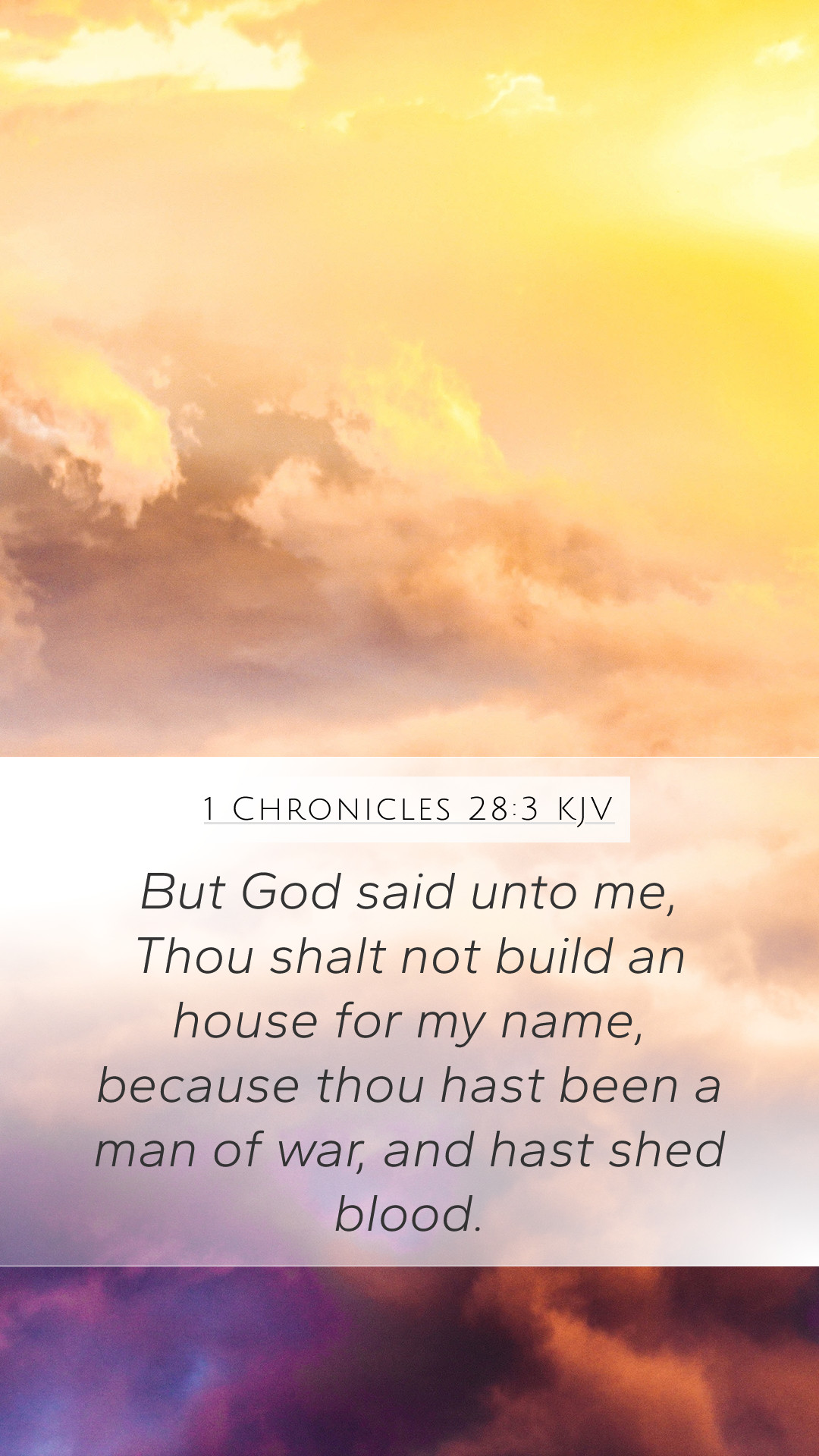Exploration of 1 Chronicles 28:3
In 1 Chronicles 28:3, we find King David addressing the assembly of Israel regarding the construction of the temple. He expresses a divine prohibition against him building the temple, citing his history as a warrior and the shedding of blood as reasons for God's decision. This passage is rich in theological and historical significance, and understanding it may provide profound insights into God's relationship with His people and the nature of leadership in biblical contexts.
Contextual Overview
To appreciate the nuances of this verse, it is essential to consider the broader narrative of 1 Chronicles. The book presents a historical account primarily focusing on King David's reign and the establishment of worship in Israel. The temple's significance symbolizes God's dwelling among His people, and David's desire to construct it underscores his heart for worship. However, God's directive alters the anticipated course of action, reflecting a divine purpose beyond human plans.
Verse Analysis
The verse states:
"But God said to me, 'You shall not build a house for my name, for you are a man of war and have shed blood.'" (1 Chronicles 28:3)
Divine Providence and Rejection of David's Plan
In this segment, David acknowledges that despite his desire, God has chosen not to allow him to build the temple. This reveals profound insights into:
- Divine Will: God has specific plans that may not align with human intentions.
- Qualifications: Leadership in worship and service often requires adherence to spiritual qualifications.
- Legacy: David's legacy is intertwined with obedience, highlighting that even great leaders must submit to God's will.
Historical Context
Understanding the historical backdrop of David’s reign provides clarity to this verse:
- Military Leadership: David's history as a warrior symbolizes both strength and the appropriate means of achieving God’s purposes.
- Shed Blood: The consequences of David's military conquests are critically observed in this context, linking personal history with spiritual mandates.
- Temple Construction: The temple is not merely a building; it embodies the covenant relationship between God and Israel.
Biblical Exegesis
Drawing from public domain commentaries:
-
Matthew Henry: In his analysis, Henry emphasizes that God's refusal is not a rejection of David as a king but rather a reflection of God's perfect plan and timing. David's heart was aligned with God's, yet God had different intentions for the temple’s construction that would be fulfilled through Solomon.
-
Albert Barnes: Barnes remarks on the transition of leadership from David to Solomon, highlighting the generational shifts in fulfilling divine commands. He expresses that while David's aspirations were noble, God’s foresight included Solomon as the rightful builder of the temple, thus maintaining the continuity of divine plans.
-
Adam Clarke: Clarke’s commentary focuses on the theological implications of this verse, illustrating how it serves as a reminder that God’s plans often transcend human understanding. He points out that God’s choice of Solomon is significant, affirming that leadership roles may come with specific divine assignments.
Applications and Reflections
When applying the insights from 1 Chronicles 28:3 to contemporary life and spiritual walks, consider these reflections:
- Submission to Divine Will: One learns to discern and prioritize divine instructions over personal desires.
- Shaping Leadership: This verse prompts us to consider the spiritual qualifications of our leaders and our own actions in service, ensuring they align with God’s directive.
- Legacy beyond Actions: Evaluate how personal history influences spiritual legacy; this understanding shapes how we approach tasks for God’s kingdom.
Cross References
Related biblical references that enhance the understanding of 1 Chronicles 28:3 include:
- 2 Samuel 7:5-7: God’s promise to David concerning the temple.
- 1 Kings 5:3-5: Solomon's acknowledgment of David's role in temple plans.
- Acts 7:47-50: Stephen’s discussion on God's dwelling among humanity.
Conclusion
The message contained in 1 Chronicles 28:3 serves as a reminder that God’s plans often diverge from human expectations. David’s heart to honor God through the construction of a temple showcases zeal for worship while simultaneously revealing the complexity of obedience to divine will. In context, this verse teaches us about submission, legacy, and the unfolding of God's divine plans through various generations.


